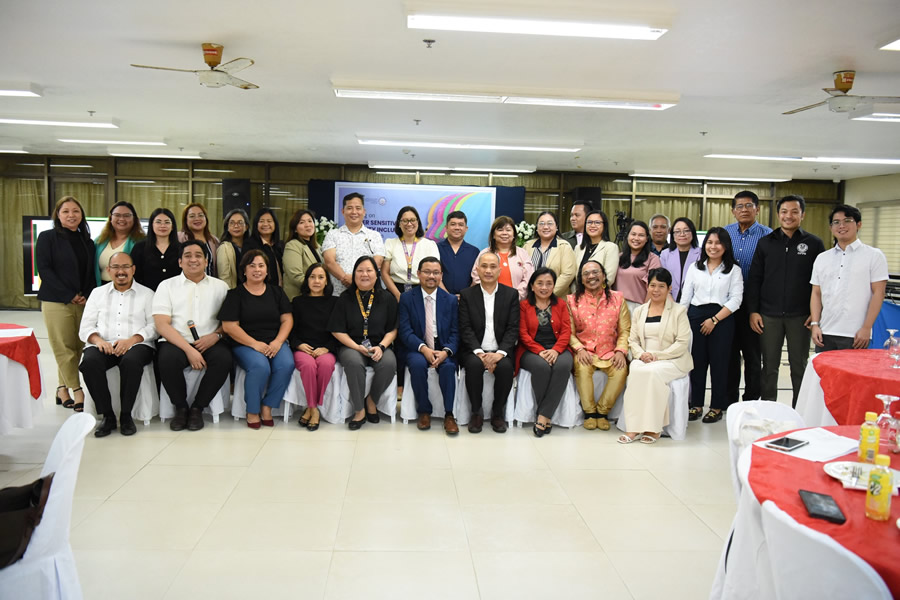By Karren Jay G. Asgar

A diverse group of law professors, speakers, and prominent figures pose together on the second day of the ‘Training on Gender Sensitivity and Diversity Inclusion for Law Professors,’ held at the Henry Luce III Library.
The Legal Education Board, in partnership with Central Philippine University, recently hosted the “Training on Gender Sensitivity and Diversity Inclusion for Law Professors” on August 29-30, 2024. This event, held at the University’s Henry Luce III Library, aimed to equip legal educators with the essential skills and knowledge needed for gender and development (GAD)-sensitive teaching of the law.
On its first day, the event began with an ecumenical prayer and the singing of the Philippine National Anthem. CPU President Rev. Dr. Ernest Howard B. Dagohoy delivered his opening remarks, emphasizing the training’s goal of developing a deeper understanding of the roles of men and women in society, increasing awareness, and addressing gender-related issues. “I pray that all of us representing our respective institutions will be at the forefront of undertakings related to gender sensitivity and diversity inclusion and may we serve as models or examples for others to follow,” Dr. Dagohoy said.
CPU College of Law Dean, Atty. Aila Rae B. Endonila, also delivered a welcome message, highlighting the significance of incorporating gender sensitivity into legal education. Following this, a keynote address was given by Legal Education Board Commissioner Salex E. Alibogha, who stressed the necessity of fostering inclusive environments within legal education and advocating for active measures to address gender disparities. “We must seize the day and implement gender sensitivity in our respective legal education institutions,” Commissioner Alibogha shared. “Let’s build a new model for gender-sensitive legal education.”
The first session, titled “Introduction to Gender Law and Current Gender-Related Issues,” was presented by Ms. Lorena T. Yunque, an Independent GAD Consultant from the Philippine Commission on Women. In her speech, she provided an insightful overview of gender law and pressing gender-related issues. “GAD is telling us that both women and men are victims of stereotyping, and it also tells us that gender issued affect women and men differently.”
The second day began with a session on “Gender Sensitivity and Introduction to Sexual Orientation, Gender Identity and Expression, and Sex Characteristics (SOGIESC),” led by Mr. Marcel L. Milliam, a Human Rights and Gender Diversity Advocate. His presentation emphasized the importance of understanding different identities within the legal context and the need to create classroom environments that are both inclusive and supportive. This was followed by Atty. Louise Aubrey P. Mejia, a Legal Associate of the UP Gender Law and Policy Program, who shared insights on the fundamentals of gender-fair language. The fourth session was delivered by Dr. Mary Barby P. Badayos-Jover, PhD, Associate Professor at UP Visayas and a National GAD Resource Pool member of the Philippine Commission on Women. She discussed “Gender Mainstreaming Concepts and Policy Imperatives: Promoting Gender Sensitivity, Diversity, and Inclusion in Pursuit of UN Sustainable Development Goal No. 5.” The final session, titled “Best Practices, Pedagogy, and Teaching Strategies to Promote Diversity and Equality in Law Schools,” was thoroughly discussed by UP College of Law Prof. Glenda T. Litong.
As the program concluded, Chairperson Jason R. Barlis shared his closing remarks, expressing his gratitude for the success of the two-day training program. “Our discussions for the past two days have [brought us] brought to light the pressing issues of gender and diversity within the realms of law, legal education, and teaching,” Commissioner Barlis said. “The legal profession is not just a career; it is a calling. It’s a calling to serve justice and uphold the rights of all individuals regardless of their gender, sexual orientation, [or] identity, or even a disability.”
CPU’s dedication to fostering an inclusive academic environment was evident throughout the training, equipping law professors with essential tools for addressing biases and enhancing diversity. This initiative underscores the Centralian community’s commitment to supporting the legal profession and reaffirms its role as a leader in advancing inclusivity in legal education.
